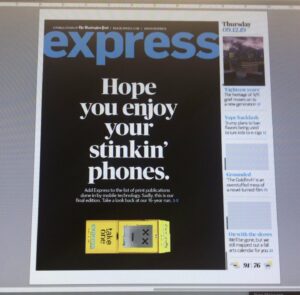Facing the curtain: How print titles are bowing out gracefully (or not)
We haven’t seen the last of the print closures. Between falling circulations in at-risk genres like the women’s weekly, the acquisition of regional news organisations by huge companies with a reputation for cutting the fat and then some, and the bleak reality that smaller newspapers don’t have the resources to pour into making digital work, the trajectory for print media remains obvious.

One of the last trials faced by an editorial team, then, at the end of a losing battle to sustain the P&L of their print product, is deciding how to bow out. There will always have to be a ‘final’ last page – the short turnaround on papers and the sentiment that people have towards them would allow for nothing less. But there are ways and ways of going about setting that final masthead and choosing the language of the final headline. Over the past few years we’ve seen more than a couple.
Some have been very classy. On Media Voices we still speak in approving tones of the final page of the last UK issue of Look magazine, which bowed out gracefully by exhorting its readers to go out and support its stablemates and even competitor print titles. There’s a sense that the industry – or at least this subsection of it – is pulling together in service of supporting the jobs of not just their colleagues, but even of their ostensible rivals. Just because one ship in the fleet foundered doesn’t mean there isn’t space to be found for survivors on the decks of the other vessels, after all.
Then there are the celebratory (and the self-aggrandising).
The Independent, for instance, strove to impart a sense of continuity, that the medium wasn’t the message and that the title would remain as vital and alive, just in a digital form to which its audience was more accustomed anyway. Local papers tend to go down this route, too, often with the implicit suggestion that its readers pick up a sister title that now carries a smattering of news relevant to them, as well.
The News Of The World, upon its ignominious closure, printed a selection of the most famous stories it had ever printed which, as the paper had for the years prior to its death, split the room. Some argued that the title had successfully served the public before its sacrifice on the altar of public opinion, while others took one look at the collection of headlines within and concluded, as Charlie Brooker did in a Screenwipe special review of 2011, that you look at the sum total of its work and say “yeah, I’m glad it’s dead”.
Or, if you really want to go out with a nuclear bang, you could do as The Washington Post Express did upon its closure the other week, and blame its audience. The histrionic, bitter headline expressed the editorial team’s hopes that its readers (or, more realistically, former readers) enjoy their phones, with the completely unsubtle implication that the public’s indifference to news in print would ultimately cost them. It may well, but that’s besides the point.
It isn’t the public’s fault that the title had failed to provide its content in a way that both appealed to the consumption habits of the day and could be monetised. Nor, really, is it the paper’s fault, since the entire industry has been grappling with that issue with varying levels of success for the better part of a decade. Some blame, certainly, needs to be apportioned to the adtech giants, who either did not recognise or did not care about the importance of supporting a free press.
But while the title printing such a bitter goodbye (effectively saying the public had never deserved them and wasn’t even that good in bed anyway) is bound to leave a sour taste in the mouths of the public who did support them, it might well be that the title’s aim was closer to that of Cosmo than it appears at first glance. The editorial team knew that such a headline would get the attention of other hacks, and might even be featured in other papers or broadcast news shows outside their home state. By directing their ire so specifically at the public, it’s likely the editorial team was attempting to galvanise the audiences of other print titles to support their own local papers. Asking nicely for support doesn’t seem to be working (notable exceptions aside), so maybe a short sharp shock of a headline might fare better.
This is all conspiracy theory. It might just be that the editor of the Post Express felt especially salty on the evening before the final issue rolled off the presses and wanted to vent, or genuinely did blame the public. However, I think it’s more likely that this is another exhortation like Cosmo’s, just inverted. If the industry is to succeed, maybe other editors need to plan how their final front page will act to support the wider industry, and avoid the temptation to perform a bittersweet victory lap for their title alone.
Chris Sutcliffe
enquiries@trippassociates.co.uk
Martin Tripp Associates is a London-based executive search consultancy. While we are best-known for our work across the media, information, technology, communications and entertainment sectors, we have also worked with some of the world’s biggest brands on challenging senior positions. Feel free to contact us to discuss any of the issues raised in this blog.